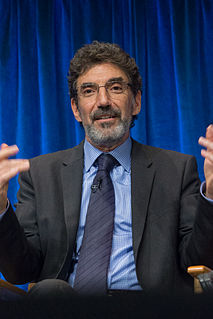A Quote by Neil Gaiman
There was a tale he had read once, long ago, as a small boy: the story of a traveler who had slipped down a cliff, with man-eating tigers above him and a lethal fall below him, who managed to stop his fall halfway down the side of the cliff, holding on for dear life. There was a clump of strawberries beside him, and certain death above him and below. What should he do? went the question. And the reply was, Eat the strawberries. The story had never made sense to him as a boy. It did now.
Related Quotes
The patient man is merry indeed.... The jailers that watch him are but his pages of honour, and his very dungeon but the lower side of the vault of heaven. He kisseth the wheel that must kill him; and thinks the stairs of the scaffold of his martyrdom but so many degrees of his ascent to glory. The tormentors are weary of him. the beholders have pitty on him, all men wonder at him; and while he seems below all men, below himself, he is above nature. He hath so overcome hlmself that nothing can conquer him.
The parents have to learn that the child should not be insulted, humiliated, condemned. If you want to help him, love him more. Appreciate what is good in him rather than emphasizing what is bad. Talk about his goodness. Let the whole neighborhood know how nice and beautiful a boy he is. You may be able to shift his energy from the bad side to the good side, from the dark side to the lighted side, because you will make him aware that this is the way to get respect, this is the way to be honored. And you will prevent him from doing anything that makes him fall down in people's eyes.
A man traveling across a field encountered a tiger. He fled, the tiger after him. Coming to a precipice, he caught hold of the root of a wild vine and swung himself down over the edge. The tiger sniffed at him from above. Trembling, the man looked down to where, far below, another tiger was waiting to eat him. Only the vine sustained him. Two mice, one white and one black, little by little started to gnaw away the vine. The man saw a luscious strawberry near him. Grasping the vine with one hand, he plucked the strawberry with the other. How sweet it tasted!
I suppose he'll die soon. I'm expecting it, like you do for a dog that's seventeen. There's no way to know how I'll react. He'll have faced his own placid death and slipped without a sound inside himself. Mostly, I imagine I'll crouch there at the door, fall onto him, and cry hard into the stench of his fur. I'll wait for him to wake up, but he won't. I'll bury him. I'll carry him outside, feeling his warmth turn to cold as the horizon frays and falls down in my backyard. For now, though, he's okay. I can see him breathing. He just smells like he's dead.
Atten. Pray of what disease did Mr. Badman die, for now I perceive we are come up to his death? Wise. I cannot so properly say that he died of one disease, for there were many that had consented, and laid their heads together to bring him to his end. He was dropsical, he was consumptive, he was surfeited, was gouty, and, as some say, he had a tang of the pox in his bowels. Yet the captain of all these men of death that came against him to take him away, was the consumption, for it was that that brought him down to the grave.
I'm thinking of writing a children's story about a leaf on a tree who arrogantly insists he's a self-made, independent leaf. Then one day a fierce wind blows him off his branch and to the ground below. As his life slowly ebbs away, he looks up at the magnificent old tree that had been his home and realizes that he had never been on his own. His entire life he had been part of something bigger and more beautiful than anything he could have imagined. In a blinding flash, he awakens from the delusion of self. Then an arrogant, self-centered kid rakes him up and bags him.
[God] arranged that the boy Samuel should be chosen but instead of teaching him directly He had him turn once or twice to an old man. This youngster, to whom He had granted a direct encounter with Himself, had nevertheless to go for instruction to someone who had offended God, and all because that person was an old man. He decided that Samuel was most worthy of a high calling and yet He made him submit to the guidance of an old man so that once summoned to a divine ministry he might learn humility and might himself become for all the young a model of deference.
I was very blessed it was Steven Spielberg who made the movie. He was very much into the redemption side of the story. They asked him in an interview why he had owned the rights to this story for 20 years before he made the movie, and he said, 'I wanted to see what the real Frank Abagnale did with his life before I immortalised him on film.'


































